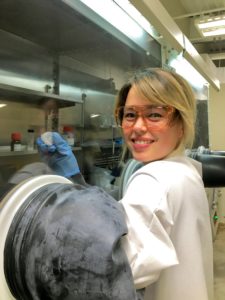Student Spotlight: Ammber Hoang

Each year, the National Science Foundation (NSF) provides millions of dollars in funding to sponsor Research Experiences for Undergraduates (REU) programs for undergraduate students at universities and colleges all across the U.S. These designated REU sites host students for 10-week research programs, providing student with in-depth experiences that they might not be able to receive otherwise.
How valuable is the program to students? We asked Ammber Hoang, a junior Chemistry major at GGC, who was selected to participate in an REU research program at the University of North Dakota UND) during summer 2019. Ammber was part of a group of approximately 12 students who participated in the program at UND. She and the other students in her orientation group were housed in the dorms during their program, and they received stipends for their participation.
Following their first day of orientation, students were assigned to different research labs, so they all had different mentors and graduate students to work with them. “I wasn’t sure what to expect,” Ammber admitted. “On my first day, I was given a research paper to read, then told to find other research papers related to it.” She was not used to being responsible for directing her own research activities, and had some problems, at first. “Some of my initial experiments failed,” she offered, “For example, I was doing experiments out in the open because I didn’t know they were supposed to be done in a glovebox. Also, a big problem was when something failed, and you didn’t know why it failed.” Her mentor’s response was to encourage her to solve the problem on her own. Ammber said this very was different compared to her traditional undergraduate experience, where classes don’t always provide as many opportunities to learn and apply problem-solving skills. When asked whether she found this helpful, her answer was “Yes. At North Dakota, my mentor let me figure it out. It was difficult and challenging, but better in the long run.”
The research project Ammber worked on was the development of novel polycarbonate-based electrolytes for solid-state Li-ion batteries (LIBs). The dominant electrolyte in todays’ commercial LIBs is a liquid solution of lithium hexafluorophosphate (LiPF6) dissolved in a mixture of cyclic and linear organic carbonates (e.g., ethylene carbonate (EC), ethyl methyl carbonate (EMC)). The extreme flammability of those carbonate-based solvents and the sensitivity of LiPF6 to moisture have inhibited development of these batteries due to safety and reliability issues. Ammber’s role in the research was to analyze the solid polymer membrane disks, assembled into coin cells, using a battery testing system (BTS) and electrochemical impedance spectroscopy (EIS). Her results indicated that the ionic conductivity of the membrane increased at elevated temperatures and exhibited stable charging/discharging plateaus, while the charge/discharge specific capacities over cycle times were stable, but not optimal. Ammber presented her research project on Polycarbonate Electrolytes for Solid-state Li-ion Batteries as a poster at the Herty Award Symposium held at GGC in fall 2019.
In addition to the research, she faced other difficult challenges during the program. She had to speak and present her research to her group each week, and as the only undergraduate in her group, she found this very intimidating. Moreover, there were events where all of the undergraduate students gave presentations, and were required to organize their research in posters. She was also surprised to observe the inner workings of a research lab. “I enjoyed working with batteries and working with polymers, but it wasn’t all what I expected it to be. Labs are dirty, and Chemists are messier (than other researchers).”
When asked about the most rewarding aspects of her experience she said “The overall experience. Being fully independent. I picked the times I needed to go in (to the lab). That’s on me. I got to see what it was like to be in research lab versus a directed lab.” The experience also influenced her future goals to pursue a position conducting research in industry.
Ammber was very positive about her experience with the program, and has maintained contact with other students from her group after returning to GGC. She also had some advice for other students considering the program. “Make sure you like the project that you are working on, and get along with the people you will be working with. Also, if you are unsure about whether to try the program, but willing to work hard, you should definitely do it.”
Information on the REU program and REU sites can be found at https://www.nsf.gov/crssprgm/reu/.
You must be logged in to post a comment.